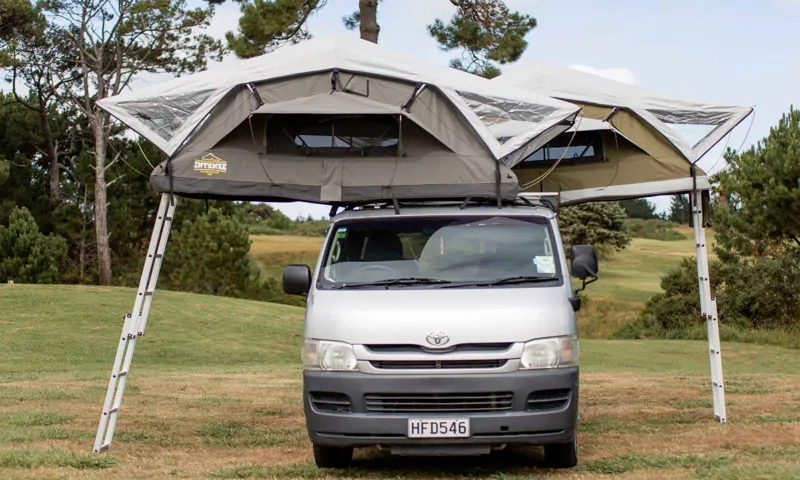Roof top tents have become increasingly popular among outdoor enthusiasts and adventure seekers. They offer the convenience of a portable shelter that can be easily set up in just a few minutes, allowing campers to sleep comfortably above the ground. But when it comes to temperature, many people wonder if roof top tents are warmer or provide better insulation compared to traditional tents.
Well, the answer is not that simple. While roof top tents do offer some advantages in terms of insulation, it ultimately depends on various factors such as the fabric used, the design of the tent, and weather conditions. One factor that can contribute to the warmth inside a roof top tent is the elevated position.
Being higher off the ground means there is less contact with the cold surface, resulting in increased insulation and warmth. Additionally, roof top tents often come with thicker mattresses or sleeping pads, which can further enhance insulation and comfort. However, it’s important to note that roof top tents can also be affected by external factors such as wind and temperature fluctuations.
A poorly designed or improperly installed tent may allow drafts and cold air to seep in, reducing the overall warmth inside the tent. Furthermore, the type of fabric used in the construction of the roof top tent can also impact its insulation properties. Some tents are made from heavy-duty, weather-resistant materials that offer better insulation, while others may use thinner fabrics that provide less warmth.
In conclusion, while roof top tents can offer better insulation and warmth compared to traditional tents, it is not a guarantee. Factors such as design, installation, weather conditions, and fabric quality play a significant role in determining the temperature inside the tent. It is important to choose a well-designed tent, properly install it, and consider weather conditions when using a roof top tent to ensure maximum comfort and warmth during your outdoor adventures.
Table of Contents
Understanding Roof Top Tents
Are roof top tents warmer than regular tents? This is a common question that many people have when considering a roof top tent for their outdoor adventures. The answer to this question depends on several factors. Roof top tents are designed to be elevated off the ground, which can provide some insulation from the cold and dampness that can seep into regular tents.
Additionally, many roof top tents come with built-in insulation or a cold-weather liner that can help to keep you warm in colder temperatures. However, it’s important to note that roof top tents are not necessarily warmer than regular tents in all situations. Factors such as the weather conditions, the materials used in the tent, and the insulation properties of the tent will all play a role in how warm or cold you feel inside the tent.
It’s always a good idea to do your research and read reviews of different roof top tents to see how well they perform in different weather conditions. Ultimately, the key to staying warm in a roof top tent is to be prepared with the right gear, such as warm clothing, a good sleeping bag, and extra blankets if needed.
What are Roof Top Tents?
Roof top tents, also known as RTTs, are a popular camping solution for outdoor enthusiasts who want to elevate their camping experience. These tents are designed to be mounted on top of a vehicle, such as an SUV or a pickup truck, creating a comfortable and convenient sleeping space. Unlike traditional ground tents, roof top tents are set up on the roof of the vehicle, providing an elevated and safe camping experience.
With a roof top tent, campers can sleep off the ground, away from crawling critters, and enjoy a better view of their surroundings. These tents are easy to set up and pack away, making them ideal for those who want to quickly set up camp and move on to the next adventure. Whether you’re camping in the mountains, near the beach, or exploring remote trails, a roof top tent offers a unique and enjoyable camping experience.
It’s like having a cozy hideaway on the roof of your vehicle, providing a comfortable and secure sleeping space wherever your travels may take you. So, if you’re ready to take your camping adventures to new heights, consider investing in a roof top tent for your next outdoor getaway.

Advantages of Roof Top Tents
roof top tents, advantages of roof top tents, understanding roof top tents
Factors Affecting Tent Temperature
One of the factors that can affect the temperature inside a roof top tent is the material used for its construction. Some tents are made with thicker and more insulating materials, which can help to keep the interior warmer. On the other hand, tents made with thinner and less insulating materials may not provide as much protection against cold temperatures.
Another factor that can affect the temperature inside a roof top tent is the presence of vents or windows. If a tent has good ventilation, it can help to regulate the temperature inside by allowing for airflow. This can be especially important in warmer climates, as it can prevent the tent from getting too hot.
Additionally, the location and placement of the tent can also impact its temperature. If the tent is set up in direct sunlight, it is likely to be hotter inside. Similarly, if the tent is set up in a shaded area, it may be cooler.
Overall, there are several factors to consider when it comes to the temperature inside a roof top tent, and understanding these factors can help to ensure a comfortable camping experience.
Insulation
tent temperature, insulation
Air Circulation
tent temperature Air circulation is an important factor that can greatly affect the temperature inside a tent. When there is good air circulation, it helps to regulate the temperature and prevent it from becoming too hot or stuffy. On the other hand, poor air circulation can lead to a buildup of heat and humidity, making the tent uncomfortable and difficult to sleep in.
There are a few factors that can impact air circulation in a tent. The size and shape of the tent play a role, as larger tents with more windows and vents tend to have better airflow. The location of the tent is also important, as being in a shaded area or near a breeze can help promote air circulation.
Additionally, the number of people and their activities inside the tent can affect air circulation, as more bodies and movement can create airflow. It’s worth mentioning that air circulation is not only important for temperature control, but also for preventing condensation and improving air quality inside the tent. Overall, ensuring good air circulation is key to maintaining a comfortable temperature inside your tent during camping trips.
External Conditions
Factors Affecting Tent Temperature When it comes to camping, the temperature inside your tent can make or break your experience. But did you know that there are external factors that can affect the temperature inside your tent? One of the main factors is the weather. If you’re camping in a hot and sunny location, the temperature inside your tent is likely to rise as the sun beats down on it.
On the other hand, if you’re camping in a cold and windy location, the temperature inside your tent can drop significantly. Another factor that can affect tent temperature is the insulation of your tent. If your tent has good insulation, it will be better at retaining heat in colder conditions and preventing heat from entering in hotter conditions.
Additionally, the size of your tent can also impact the temperature inside. A larger tent will take longer to heat up and cool down compared to a smaller tent. It’s also important to consider the location of your tent.
Camping near bodies of water or in shaded areas can help regulate the temperature inside your tent, as the water or shade can provide some relief from extreme temperatures. So, when planning your camping trip, be sure to take these factors into consideration to ensure a comfortable temperature inside your tent.
Temperature Comparison: Roof Top Tents vs Ground Tents
When it comes to camping, staying warm at night is essential for a comfortable outdoor experience. One common question people have is whether roof top tents are warmer than ground tents. The answer depends on a few factors.
In general, roof top tents tend to be warmer than ground tents because they are elevated off the ground, which helps to insulate them from the cold temperatures below. Additionally, the proximity to the vehicle can provide some heat, especially if the vehicle is running. However, it’s important to note that the material and insulation of the tent itself also play a significant role in determining its warmth.
So while roof top tents may have some advantages when it comes to staying warm, it’s crucial to choose a tent with proper insulation and consider other factors such as weather conditions and the camping location.
Scientific Research on Tent Temperature
tent temperature, roof top tents, ground tents, scientific research, temperature comparison
Comparison of Heat Retention
roof top tents, ground tents, heat retention, temperature comparison When it comes to camping, one of the key considerations is keeping warm during those chilly nights. Whether you choose a roof top tent or a ground tent, heat retention is an important factor to consider. So, let’s compare the temperature levels between roof top tents and ground tents.
In terms of heat retention, roof top tents have the advantage. They are designed to be mounted on top of your vehicle and are elevated off the ground. This elevation helps to keep you warmer as it prevents cold air from seeping in from the ground.
Additionally, the insulation in roof top tents is often thicker and more efficient, helping to trap heat inside the tent. On the other hand, ground tents have a higher chance of heat loss due to their direct contact with the ground. The cold ground can easily transfer its chilliness into the tent, making it harder to stay warm.
Ground tents also have thinner insulation compared to roof top tents, which means that there may be more heat loss through the walls and floor. However, it’s important to note that the temperature inside the tent will still depend on external factors such as the ambient temperature and the quality of your camping gear. To maximize heat retention, it’s advisable to use a good quality sleeping bag, a warm blanket, and to layer your clothing.
In conclusion, if staying warm is a top priority for you while camping, a roof top tent may be the better option. Its elevation and thicker insulation provide better heat retention compared to ground tents. However, it’s essential to consider all factors such as the type of camping you’ll be doing and your personal preferences before making a decision.
Ultimately, the goal is to have an enjoyable and comfortable camping experience, so choose the tent that best suits your needs.
Difference in Airflow
tent airflow, roof top tents vs ground tents, temperature comparison. When it comes to camping, one of the most important considerations is airflow inside the tent. After all, who wants to sleep in a stuffy, confined space? This is where roof top tents and ground tents differ significantly.
Roof top tents are designed to be mounted on top of your vehicle, which means they are elevated off the ground. This elevation allows for better airflow as there are no obstructions or moisture from the ground. On the other hand, ground tents are directly on the ground, which can lead to poor airflow.
Moisture can get trapped, causing a damp and uncomfortable environment inside the tent. Additionally, ground tents are more prone to condensation, especially in colder temperatures. This can make the inside of the tent feel colder than the outside.
In contrast, roof top tents are positioned higher off the ground, allowing for better ventilation and airflow. Overall, if you value a comfortable and well-ventilated sleeping space, a roof top tent may be the better option for you.
Effect of Ground Contact
Roof top tents and ground tents are both popular options for outdoor camping, but have you ever considered how the temperature inside these tents might differ? The effect of ground contact is one factor that can greatly impact the temperature inside a tent. When using a ground tent, the tent floor is in direct contact with the ground, which can transfer heat or cold depending on the weather conditions. In contrast, roof top tents are mounted on top of a vehicle, ensuring there is no contact with the ground.
This can provide insulation from the cold ground during chilly nights or provide relief from hot ground during scorching summer days. The added elevation of roof top tents can also allow for better airflow, helping to regulate the temperature inside the tent. So, when it comes to temperature, roof top tents may have an advantage over ground tents in providing a more comfortable camping experience.
Tips to Keep Your Tent Cool
Are roof top tents warmer than regular tents? It’s a common question among outdoor enthusiasts. The answer is yes, roof top tents can be warmer than regular tents, especially during hot summer months. The reason for this is because roof top tents are raised off the ground, which can create a heat trap underneath.
When the sun beats down on the tent, the heat is absorbed by the roof and can get trapped inside, making the inside temperature much higher than the outside temperature. However, there are ways to keep your roof top tent cool. One tip is to park your vehicle in shaded areas or use a shade cloth to provide some relief from the sun.
Another tip is to open all the windows and vents to allow for air circulation. Additionally, using a portable fan or a battery-powered fan can help to circulate the air and keep you cool inside the tent. So, while roof top tents may be warmer, with some simple tricks, you can still enjoy a cool and comfortable camping experience.
Insulation Techniques
tent insulation, keep tent cool, insulation techniques, heat reduction, hot weather, thermal barrier, airflow, shade, ventilation, reflective lining, cool down tent Did you know that you can use insulation techniques to keep your tent cool? It’s true! When camping in hot weather, it can be challenging to stay comfortable inside your tent. However, with the right strategies, you can create a thermal barrier that reduces heat and keeps your tent cool even on scorching days. One of the easiest ways to cool down your tent is to find a shady spot to set it up.
This will help shield your tent from direct sunlight and prevent it from absorbing excess heat. Another technique is to improve airflow by positioning your tent in a location where there is a natural breeze. You can also create extra ventilation by opening up windows or using mesh panels.
Additionally, you can invest in a tent with a reflective lining that helps deflect heat and light away from the inside. By implementing these insulation techniques, you can significantly reduce the heat inside your tent and enjoy a more comfortable camping experience in hot weather. So don’t let the heat get you down – keep your tent cool and beat the summer heat!
Ventilation Solutions
tent ventilation solutions
Choosing the Right Campsite
Tips to Keep Your Tent Cool: When camping in hot weather, it’s important to find ways to keep your tent cool and comfortable. One of the easiest ways to do this is by choosing the right campsite. Look for a spot that provides shade during the hottest parts of the day, such as underneath a tree or against a hillside.
This will help to block out direct sunlight and keep your tent cooler. Additionally, try to position your tent in an area with good airflow. A spot near a body of water or in an open field can help to create a breeze that will naturally cool down your tent.
Lastly, consider investing in a tent with good ventilation. Look for one with mesh windows or a rain fly that can be partially opened to let in fresh air. By following these tips, you can ensure a cooler and more comfortable camping experience.
Conclusion
So, are rooftop tents warmer? Well, if you’re talking about the cozy factor, then I’d say yes! There’s just something about snuggling up in a tent perched high above the ground that adds an extra level of warmth and charm to the experience. But if we’re talking about actual temperature, then it’s a bit more complicated. While being closer to the stars might seem like a surefire way to stay toasty, the reality is that rooftop tents are not magically warmer than ground tents.
Yes, they might be slightly elevated, which can help prevent any unwanted drafts or ground moisture from seeping in. And being elevated also means you’ll have a better view to admire while sipping your morning coffee. But when it comes to keeping warm, it ultimately depends on the insulation and build quality of the tent itself.
So, if you’re considering a rooftop tent solely for its warmth-giving powers, you might be better off investing in a high-quality, well-insulated ground tent. But if you’re looking for that extra dose of adventure and the ability to sleep under the stars wherever your four wheels take you, then a rooftop tent is definitely the way to go. After all, who needs a little extra warmth when you have the freedom to explore and the stars as your ceiling? So, if you’re ready to elevate your camping game and bring some extra warmth to your outdoor endeavors, then a rooftop tent might just be your ticket to comfort and adventure, all rolled into one cleverly designed package.
FAQs
Are roof top tents warmer than regular tents?
Roof top tents can be warmer than regular tents due to their elevated position, which allows for better airflow and insulation from the ground.
How do roof top tents keep you warm?
Roof top tents typically come with built-in insulation, such as foam or thermal barriers, which help to retain heat and keep you warm during cold weather camping trips.
Are roof top tents suitable for winter camping?
Yes, roof top tents can be suitable for winter camping as long as they are properly insulated and equipped with features like a rainfly or vestibule to protect from wind and snow.
Can I use a heater inside a roof top tent?
It is not recommended to use a heater inside a roof top tent due to safety concerns. However, there are alternative options like using portable electric blankets or heated sleeping bags to stay warm.
Are roof top tents better insulated than ground tents?
Roof top tents are generally better insulated than ground tents due to their elevated position, which reduces contact with the cold ground and minimizes heat loss.
Do roof top tents have ventilation options to regulate temperature?
Yes, most roof top tents have ventilation options like windows and vents that can be opened or closed to control airflow and regulate temperature inside the tent.
Can I use a roof top tent all year round?
Roof top tents can be used all year round, but it is important to consider the climate and weather conditions of your camping destination. Proper insulation and additional gear like sleeping bags or thermal clothing may be necessary in colder temperatures.



